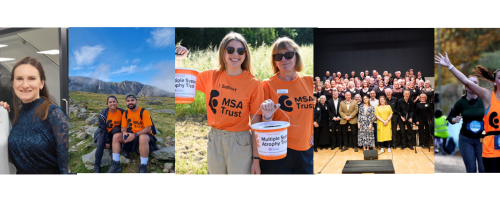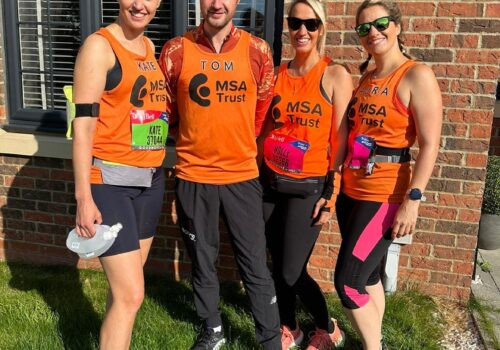Introducing Dr Lou Wiblin

Dr Lou Wiblin
The PSP Association has agreed for us to re-publish one of their blogs by Dr Lou Wiblin who is carrying out research into several neurological diseases including MSA.
In her first guest blog, Lou introduces us to her research activities and explains what goes on behind the scenes.
Hello everyone! I am a registrar in neurology based in the North East of England. My particular interests are movement disorders, especially Progressive Supranuclear Palsy and Multiple System Atrophy (known as subtypes of Parkinson’s disease) and in controlling symptoms in advanced neurological problems.
I am currently setting up a research project based at Newcastle University and with the Newcastle Hospitals NHS Trust, looking at PSP and MSA and how it affects the quality of peoples’ lives – both of patients and the people who help care for them. The project will also look at the need for symptom control or palliative care and what the perception is of palliative care. This is being supervised by Professor David Burn.
My aims for the project are to find whether certain groups have particular needs or reduced quality of life and how neurology services might be able to intervene and plan to improve peoples’ experiences. The project will comprise mainly of questionnaires and interviews and will be done largely on a face-to-face basis. Patients and carers will answer questions to explore their symptoms, day-to-day lives and what factors influence their quality of life. Patients will be examined so that an assessment can be made of how advanced their disease is physically. There will also be an opportunity for patients and carers to have recorded interviews where they discuss the impact their disease has on them and give their own perspective, which I will analyse.
I am also working with a large team across many hospitals across the country and based out of the National Hospital for Neurology and Neurosurgery on a study called PROSPECT in MSA and PSP. This is looking at blood, spinal fluid and psychological testing amongst many other tests to better understand these conditions. This is being headed by Professor Huw Morris.
This idea behind this blog is to show people in the PSP and MSA communities how research works and the trials and tribulations of making a project happen. I am happy to answer questions about the research process (remembering that anyone within a project has confidentiality so I cannot comment on individuals). If it helps get rid of some of the mystery and some of you consider taking part in research then my job is done! You can reach me on Twitter via @dr_wiblin
At the moment, my project is nearly ready to begin. It has taken almost two years to reach this stage. Research requires preparation, firstly of the idea, then planning how you will make the research happen. The recipe of doing research is called the ‘protocol’ and has to go through a rigorous process where a panel of experts make sure that the study is suitable to be done with patients and that is safe. This is known as ethical review. After a project passes this stage, the NHS does its own review to be sure that patient safety and confidentiality is paramount. My project has ethics clearance and is waiting for NHS R&D approval before it starts.
When a research study is ‘given the green light’ doctors and nurses, if they are part of the recruiting team, can discuss with patients whether they might want to take part. All patients (and carers, if they can be part of the research) are told that research is optional and people can leave research at any time.
Why do people do research? There are different types of study. Some involve the use of a new drug or treatment and it is often compared with either the usual treatment, or if there isn’t one, a neutral or placebo. This helps to tell researchers whether all positive effects are from the drug or how much is due to ‘the placebo effect’ where people feel benefit as they know they might be taking something new and helpful.
Other types of research look for links or associations which can help inform doctors to improve ways to treat patients. For example certain types of the same disease might result in early mobility problems whereas another type might be particularly prone to pain which patients may not always report. Rather than trying to provide all services to all people, research findings like these may help to target particular needs; providing early physiotherapy to the first type of patient and providing pain reviews in the second.
Whatever the type of research, as researchers we are always very grateful to the people who volunteer. It allows us to learn and to change how we do things, hopefully for the better for the people we care for and those who care about them.
At the moment my project is planned to be available to patients who are cared for at the Newcastle Hospitals and the James Cook University Hospital, Middlesbrough. However, projects can change and grow over time (with the appropriate R&D and ethics taken into account, of course!) so I will update if this changes.
Let me know if you have any questions about this brief overview. I will be back soon, and hopefully will be up and running. Until then, take care.
Disclaimer: The views and opinions expressed in the blogs published on these pages are those of the authors and do not necessarily reflect the official policy or position of the MSA Trust.




